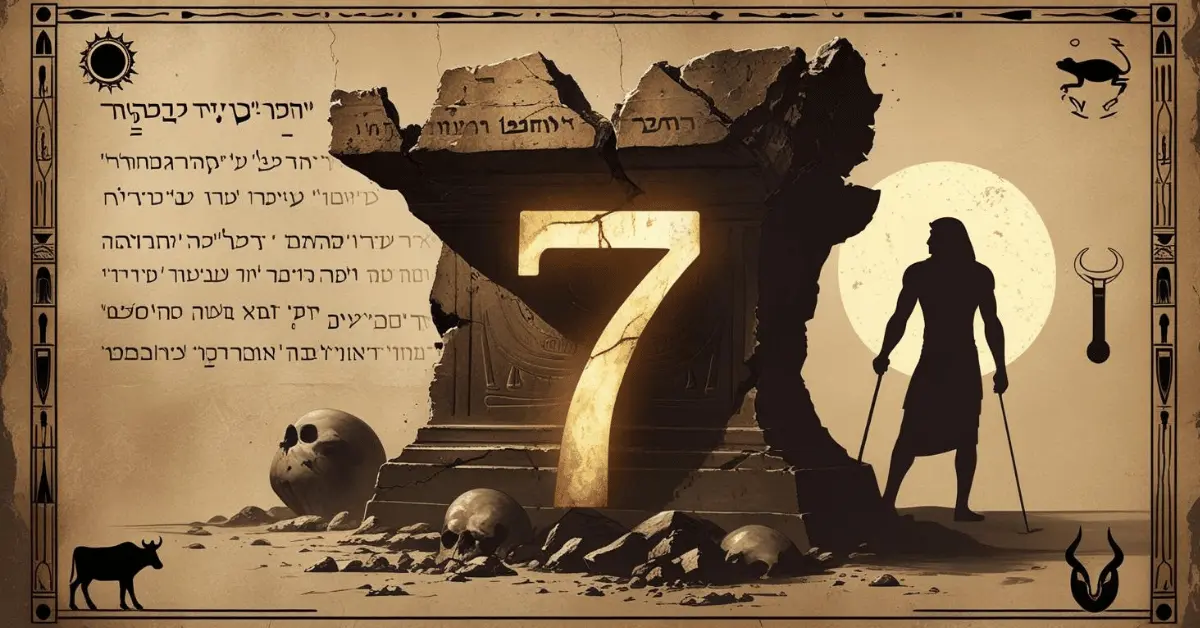“When human pride rises, divine power answers.”
The Israelites, oppressed for generations under the weight of Egyptian slavery, become the central figures in this divine drama. God, in His mercy, calls Moses, an unlikely leader, to stand before Pharaoh with a clear command: “Let My people go.”
Yet, Pharaoh’s heart remained hardened. His defiance of God’s will set the stage for a series of cataclysmic events that would reverberate through Egypt.
While the Bible chronicles ten plagues in total, our study will delve into seven of the most potent and spiritually profound.
Also Read: 10 Bible Verses to Overcome Guilt and Find God’s Forgiveness
Egypt, Slavery & God’s Promise
Who Were the Israelites in Egypt?
For over 400 years, the Israelites lived in Egypt — but not in freedom. What began as refuge during Joseph’s time slowly turned into generations of bondage. Forced into harsh labor, they built Egypt’s cities and monuments under relentless oppression.
Who Was Pharaoh?
Pharaoh was the supreme ruler of Egypt — a man regarded as divine by his people. His authority, believed to be bestowed by the gods themselves, was absolute, his word unchallengeable.
Why Did God Intervene?
Centuries earlier, God made a covenant with Abraham, promising that his descendants would inherit a land of their own. This covenant was a significant event in the history of the Israelites, as it was a promise of future prosperity and freedom.
“I have heard their groaning and have come down to set them free.” – Exodus 3:7
Related: 5 Powerful Graces of God You Never Knew You Needed
The 10 Plagues of Egypt
| Plague | Description | Reference |
|---|---|---|
| 1 | Water to Blood | Exodus 7:14–24 |
| 2 | Frogs | Exodus 8:1–15 |
| 3 | Gnats | Exodus 8:16–19 |
| 4 | Flies | Exodus 8:20–32 |
| 5 | Death of Livestock | Exodus 9:1–7 |
| 6 | Boils | Exodus 9:8–12 |
| 7 | Hail | Exodus 9:13–35 |
| 8 | Locusts | Exodus 10:1–20 |
| 9 | Darkness | Exodus 10:21–29 |
| 10 | Death of Firstborn | Exodus 11–12 |
Water Turned to Blood (Exodus 7:14–24)
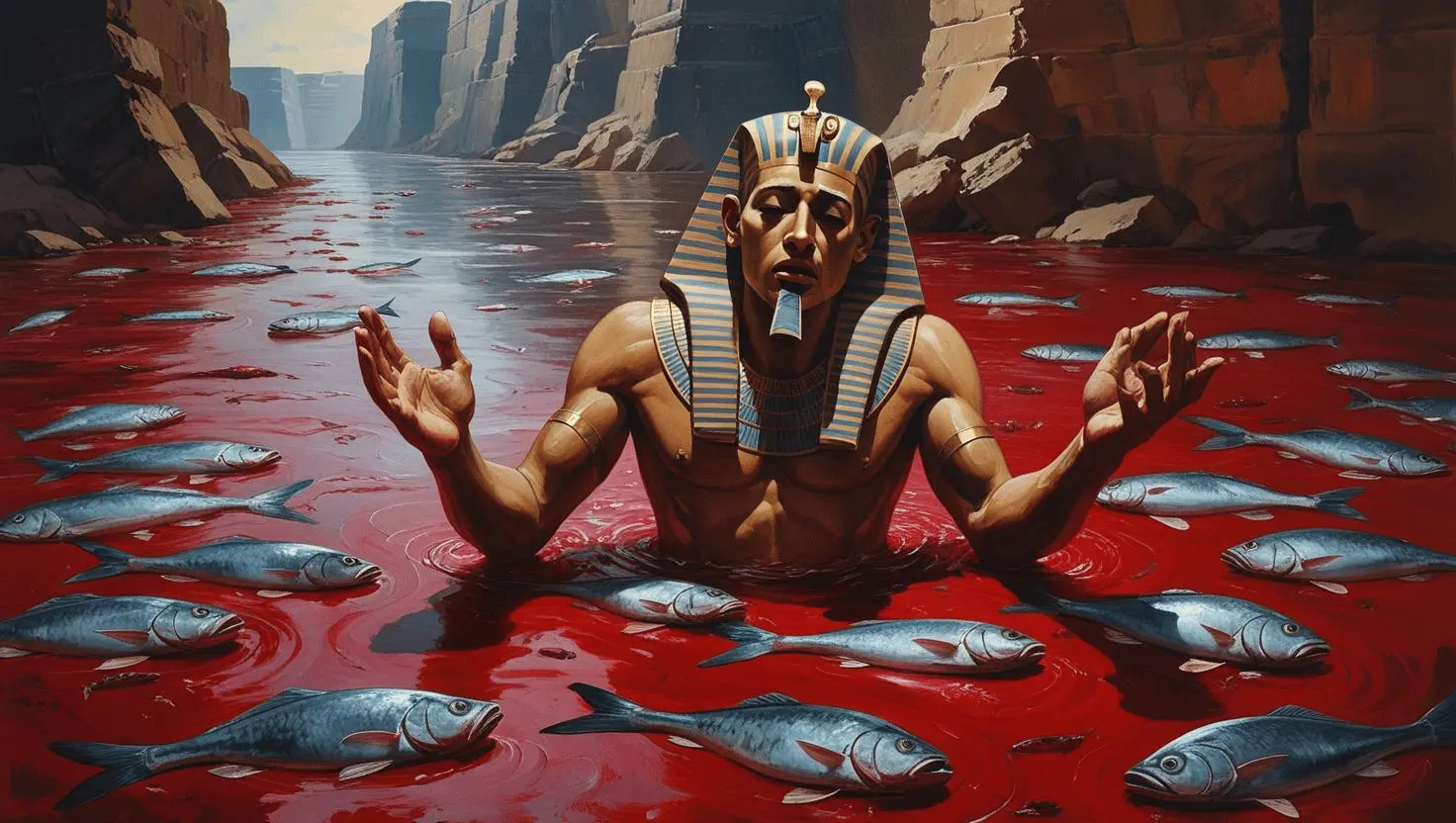
What Happened
Moses, under God’s command, struck the waters of the Nile with his staff. In an awe-inspiring display of power, the life-giving river turned into blood. The transformation was total — from the river itself to every canal, pond, and even water stored in buckets and jars. Fish floated lifelessly to the surface, the stench filled the air, and Egypt’s people could find nothing to drink.
Egyptian God Hapi Challenged
Hapi, the God of the Nile, was revered as the source of Egypt’s prosperity. By striking the Nile, God was making a direct statement: no idol, however sacred to a nation, can stand against the Creator of all.
Impact on Egypt
- Environmental devastation – The Nile, Egypt’s lifeline, became a scene of death.
- Economic disruption – Fishing, trade, and agriculture were instantly crippled.
- Spiritual shock – Egypt’s faith in its gods was shaken at the core.
Spiritual Significance
From this plague, we learn a profound spiritual lesson. God demonstrated His power to touch the very source of human life and economy. What Egypt worshiped, He judged — showing that He alone sustains life and prosperity.
Plague 2: Frogs (Exodus 8:1–15)
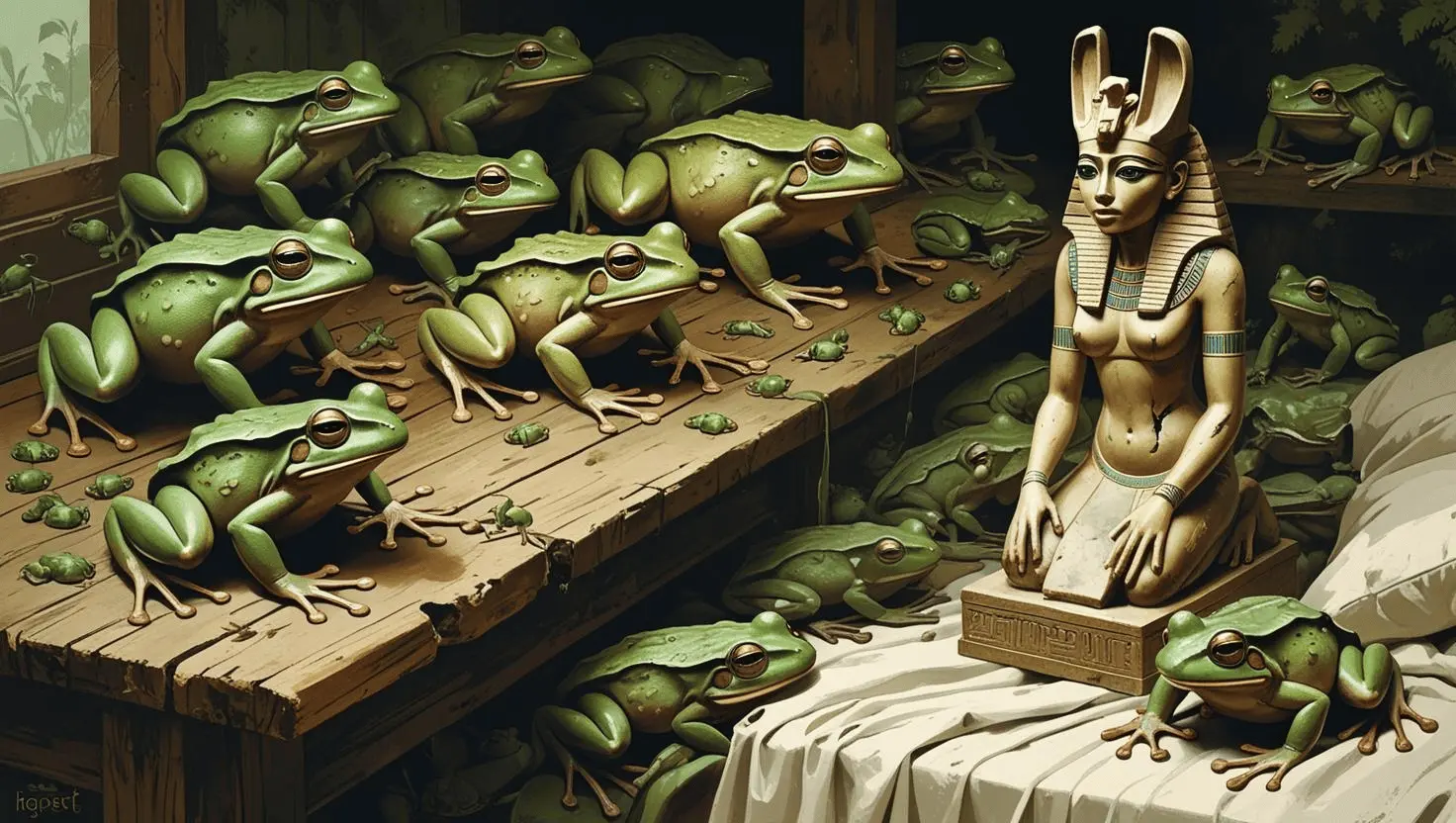
What Happened
At God’s command, a multitude of frogs poured out of the Nile in such overwhelming numbers that they invaded homes, climbed into beds, leapt into ovens, and hopped across kitchens. No place was left untouched by this awe-inspiring display of divine power. Pharaoh, driven to desperation, pleaded with Moses to pray for relief. Moses prayed, the frogs died, and the land reeked with their decay.
This plague struck directly at Heqet, the frog-headed goddess of fertility and new life. Frogs were considered sacred in Egypt — killing them was forbidden. By turning a symbol of blessing into a curse, God demonstrated His supreme power over Egypt’s false gods.
Impact on Egypt
- National discomfort – No home, street, or palace was free from the invasion.
- Uncleanliness – Dead frogs filled the land with unbearable stench.
- Daily life disrupted – Work, rest, and routines ground to a halt.
God can disturb the false sense of comfort we build in life. What the Egyptians once welcomed as a sign of blessing became a source of misery — a profound reminder that only God defines what is truly good.
Also Read: 10 Powerful Bible Verses About Praise and Worship
Plague 4: Flies (Exodus 8:20–32)
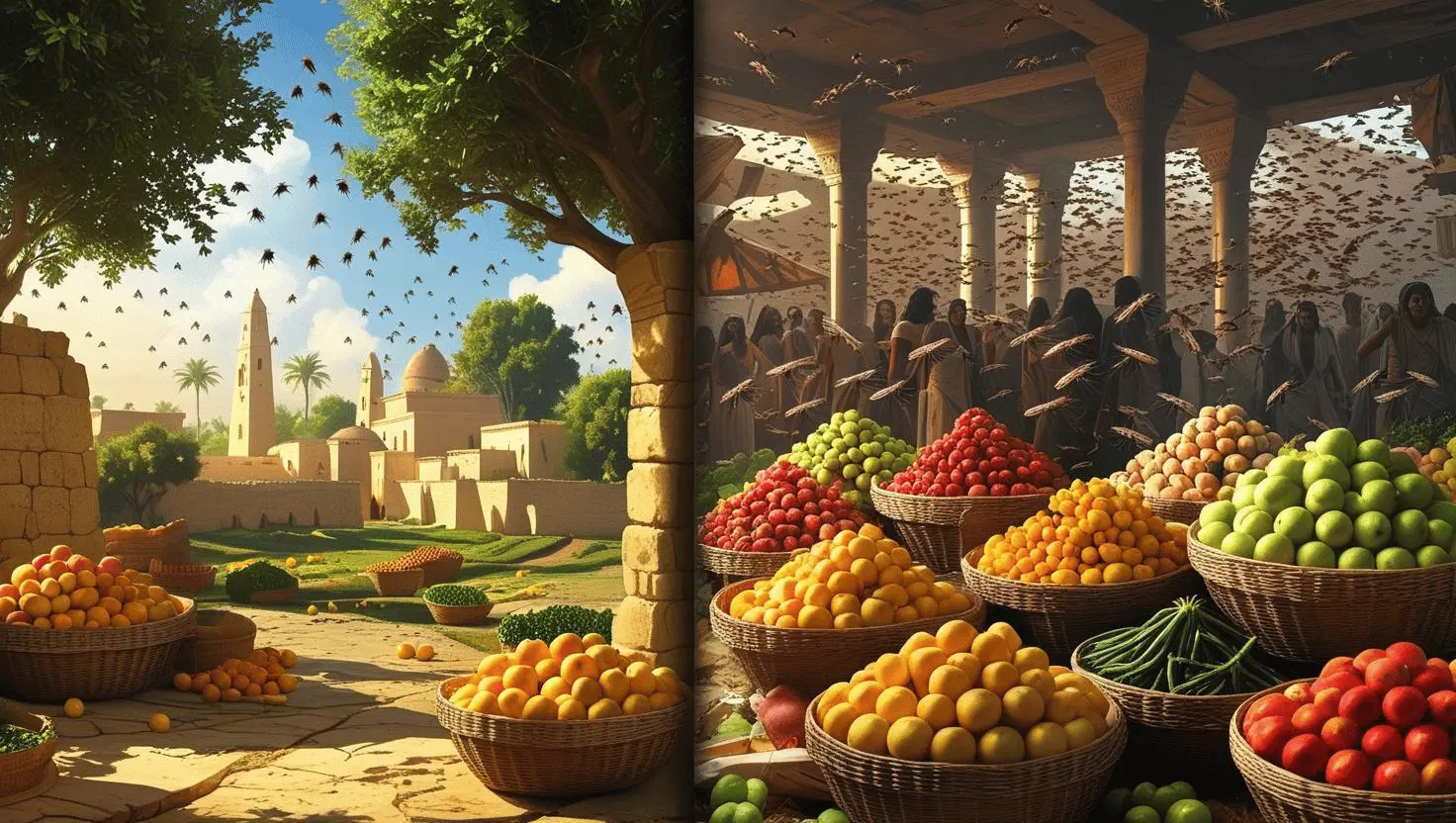
What Happened
God sent Moses to confront Pharaoh once more: “Let My people go, so that they may worship Me.” When Pharaoh refused, swarms of flies descended upon Egypt. They filled homes, covered food, and swarmed every corner of the land. The buzzing and biting were relentless. Yet, in Goshen — the region where the Israelites lived — not a single fly was found, highlighting the stark contrast between the suffering of the Egyptians and the protection of the Israelites.
Egyptian God Uatchit Challenged
This plague challenged Uatchit, a fly deity believed to offer protection from pestilence. By unleashing swarms upon Egypt and sparing His people, God revealed His authority over both nature and Egypt’s false gods.
Impact on Egypt
- Psychological torment – The constant swarm created unrest and frustration.
- Spread of disease – Flies carried filth, contaminating food and water.
- Separation of people – The Israelites’ protection set them apart from their oppressors.
For the first time in the plagues, God drew a clear line between His people and Egypt. His judgment and mercy were on display simultaneously — punishment for rebellion, protection for obedience.
Reflection for Today
God’s people are not exempt from all hardship, but they are marked by His presence and care. Even in seasons of turmoil, He knows those who belong to Him and can shield them in ways the world cannot understand.
Plague 5: Death of Livestock (Exodus 9:1–7)
What Happened
“Let My people go, so that they may worship Me.” When Pharaoh refused, a devastating plague, a clear manifestation of God’s sovereignty, swept through Egypt, killing all their livestock — horses, donkeys, camels, cattle, sheep, and goats. In stark contrast, not a single animal belonging to the Israelites died.
Egyptian God Hathor Challenged
This plague directly targeted Hathor, the cow-headed goddess of love and protection, and Apis, the sacred bull god associated with strength and fertility. These were not just symbols of wealth and religious pride, but integral parts of the Egyptian belief system.
Impact on Egypt
- Economic collapse – Loss of livestock crippled farming, trade, and transport.
- Food insecurity – Meat, dairy, and livestock were gone overnight.
- Spiritual humiliation – Egypt’s gods of prosperity were powerless to save them.
Spiritual Significance
Livestock in Egypt symbolized strength, stability, and divine favor. By destroying them, God showed that proper security and blessing do not come from wealth, possessions, or false deities, but from Him alone.
Also Read: 10 Bible Verses That Will Wipe Out Your Anxiety in Seconds
Plague 6: Boils (Exodus 9:8–12)
What Happened
Following God’s instructions, Moses took handfuls of furnace ashes and tossed them into the air before Pharaoh. The fine dust spread across Egypt, and painful boils erupted on people and animals alike. Even Pharaoh’s magicians — who once stood as symbols of Egypt’s spiritual power — were stricken and could not stand before Moses because of their affliction.
Egyptian God Sekhmet Challenged
This plague was a direct strike against Sekhmet, the lion-headed goddess believed to bring healing, and Serapis, worshiped as a protector against disease. In an instant, the gods the Egyptians trusted for health were shown to be powerless, highlighting the overwhelming supremacy of our God.
Impact on Egypt
- Physical pain – The boils caused intense suffering throughout the land.
- Public humiliation – From peasants to palace officials, no one was spared.
- Loss of control – Even Egypt’s spiritual leaders were powerless to help themselves.
Spiritual Significance
The plague of boils demonstrated that human wisdom, status, and resources are meaningless without God’s authority. It humbled Egypt’s most esteemed figures, showing that even the strongest are vulnerable when God removes His protection.
Reflection for Today
When we lean solely on our own abilities, intellect, or health, we quickly discover our limits. Proper security comes from living under God’s covering, where His power is our strength in times of weakness.
Plague 7: Hail and Fire (Exodus 9:13–35)
What Happened
God commanded Moses to deliver a final warning to Pharaoh: “Let My people go, so that they may worship Me.” When Pharaoh refused, the skies over Egypt darkened. A massive storm erupted — hailstones mixed with fire rained down, shattering crops, killing livestock left in the fields, and destroying buildings.
Sky Goddess Seth And Osiris Challenged
This plague defied Nut, the sky goddess; Seth, the storm god; and Osiris, the God of agriculture. By controlling the sky, weather, and harvest, God dismantled Egypt’s faith in its deities and proved His supreme dominion over creation. This was not just a display of power, but a profound revelation of God’s sovereignty over all aspects of life, including those that the Egyptians believed were under the control of their gods.
Impact on Egypt
- Agricultural ruin – Crops were annihilated, threatening the nation’s food supply.
- Fear of divine power – Even Pharaoh’s officials began to heed Moses’ warnings.
- Pharaoh’s temporary surrender – In rare humility, Pharaoh admitted, “I have sinned,” but his repentance did not last.
Spiritual Significance
The storm was not just a display of destructive power — it was a declaration that the God of Israel commands the forces of nature. Egypt’s worship of the natural world crumbled under the reality of the Creator’s authority.
Reflection for Today
Natural disasters remind us of our fragility and our dependence on forces far beyond human control. For God’s people, storms are not meant to destroy but to call us closer to Him, anchoring our trust in His protection and purpose.
Plague 9: Darkness (Exodus 10:21–29)
What Happened
At God’s command, Moses stretched out his hand toward the sky, and a deep, impenetrable darkness covered Egypt for three whole days. It was so heavy that people could not see one another or leave their homes.
Egyptian Sun God Ra Challenged
This plague was a direct assault on Ra, Egypt’s most revered deity — the sun god, considered the giver of life and power. In silencing the sun, God demonstrated His supreme power, showing that even Egypt’s greatest God was nothing before Him.
Impact on Egypt
- Panic – The sudden loss of light disrupted all activity and caused widespread fear.
- Depression – The oppressive darkness weighed heavily on hearts and minds.
- Spiritual fear – The people saw their most powerful deity defeated in utter silence.
Spiritual Significance
Throughout Scripture, light and darkness are symbolic of God’s presence or absence. By plunging Egypt into total darkness, God revealed the emptiness of life apart from Him, while showing His people that His light remains constant, a reassuring beacon for those who belong to Him.
Reflection for Today
Are we walking in the light or stumbling in the dark? In a world filled with confusion and fear, God alone is the trustworthy source of light — guiding, protecting, and giving hope when all else fails.
God’s Purpose Behind the Plagues
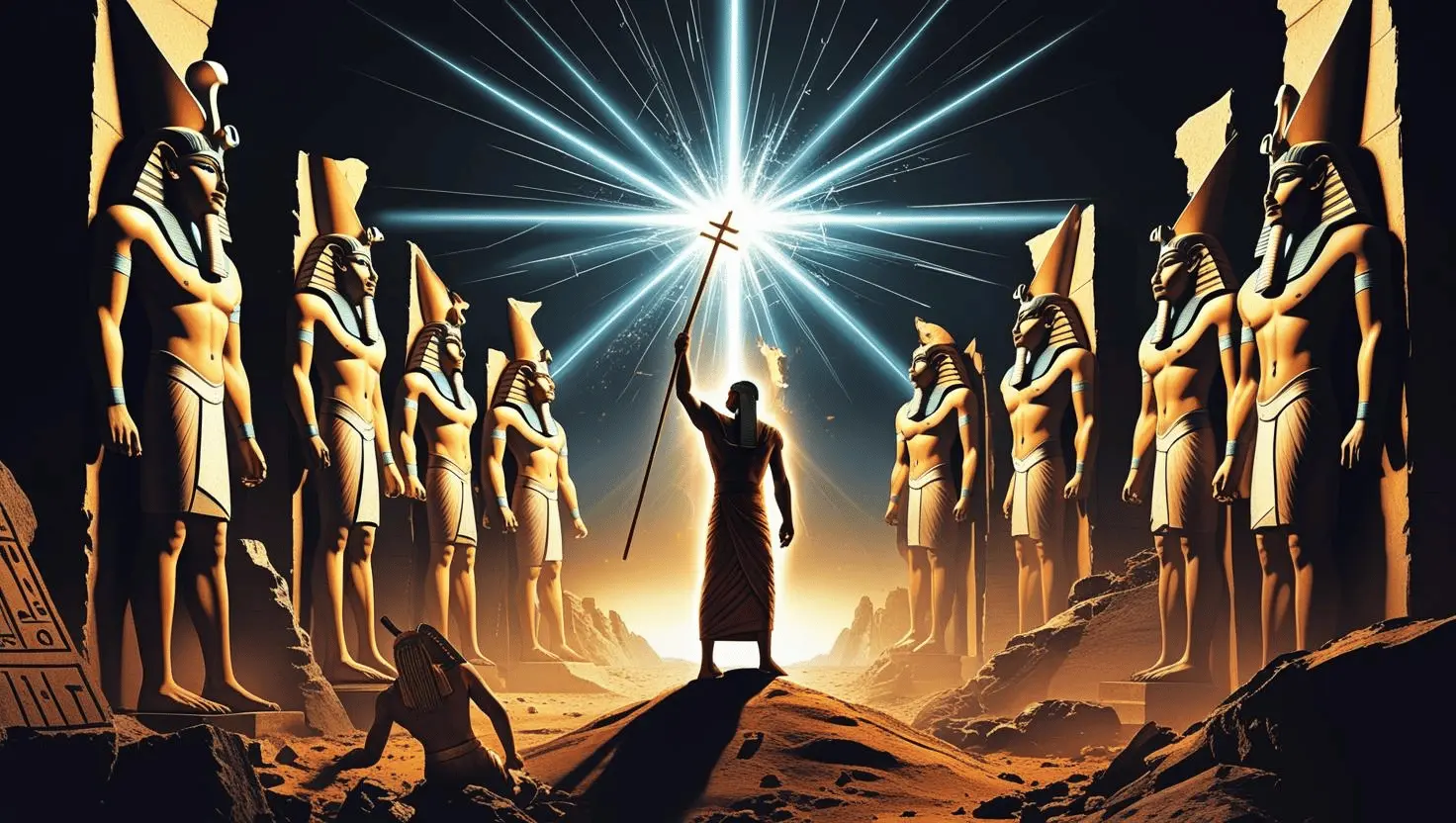
Judgment and a Sign
The plagues were not random acts of destruction. Each one was a deliberate judgment against Egypt’s oppression and a clear sign of the Lord’s authority over all creation (Exodus 7-12).
Dismantling False Gods
God struck at the very heart of Egypt’s belief system. Each plague exposed the powerlessness of their gods — from the Nile and livestock to the sun itself — proving that no idol can stand against the living God.
Power, Justice, and Mercy
Through the plagues, God revealed His power in commanding nature, His justice in defending the oppressed, and His boundless mercy in protecting His people and offering warning before judgment.
Opportunities to Repent
Pharaoh was given chance after chance to submit. God’s infinite patience is a gift, but not without end. The plagues remind us that His warnings are acts of grace, meant to turn hearts before judgment falls.
Moses: The Obedient Messenger
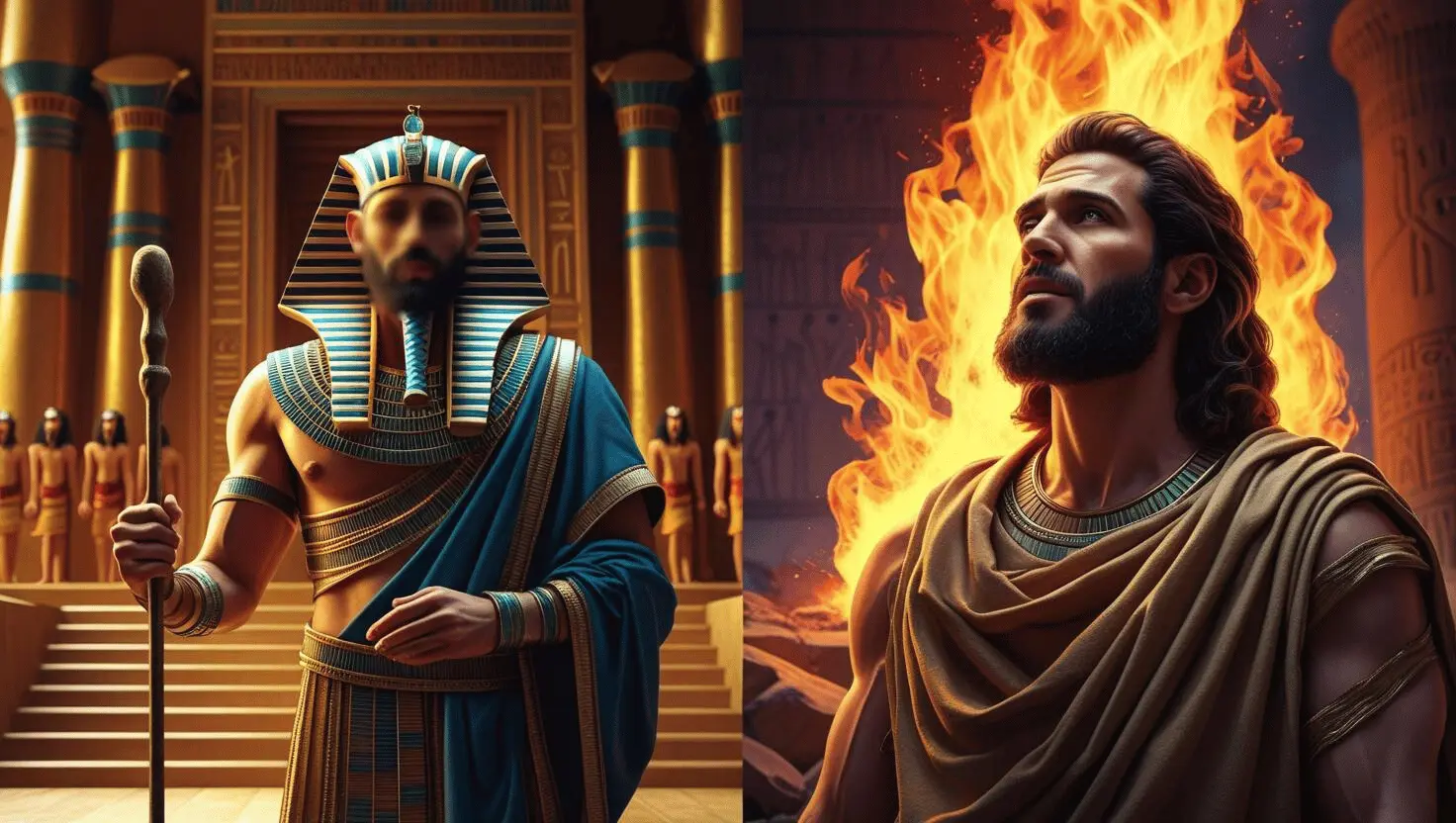
From Reluctant Servant to Bold Leader
When God first called Moses at the burning bush, he was filled with doubt and fear. He questioned his ability, feared Pharaoh, and wondered if the people would listen. He evolved from a hesitant servant to a bold leader, ready to confront the most powerful ruler on earth.
Obedience at the Heart of God’s Plan
Moses’s role was not to perform miracles in his own strength, but to obey God’s commands. His willingness to speak when God said “speak” and act when God said “act” made him a vital instrument in the deliverance of Israel, a testament to the power of obedience in God’s plan.
Standing Firm in the Face of Resistance
Despite repeated refusals, threats, and Pharaoh’s hardened heart, Moses did not back down. His courage, not from self-confidence, but from unwavering trust in the God who sent him, serves as a beacon of hope for all believers.
Conclusion: The Revelation of God’s Glory
The plagues of Egypt were far more than acts of punishment. They were a divine declaration of God’s supremacy over every false power, a display of His mercy toward His people, and a testimony to His unwavering commitment to keep His promises.
In our own lives, we may not face literal rivers of blood or storms of hail, but we encounter “plagues” of a different kind — trials, disruptions, and moments of deep challenge.
The question remains: will we respond like Pharaoh, hardening our hearts and resisting His voice? The choice is ours, and it reveals whether we stand in the shadows of rebellion or in the light of His deliverance.
FAQ Section
How many plagues were there in Egypt?
10 total, recorded in Exodus 7–12.
Why did God send plagues?
To free Israel, judge Egypt’s gods, and display His power.
Did Pharaoh ever repent?
Temporarily, but repeatedly hardened his heart.
Are the plagues historical?
Many scholars believe they were historical events with divine timing and significance.
Do the plagues relate to Revelation?
Yes, Revelation echoes the Exodus plagues as part of God’s future judgment

